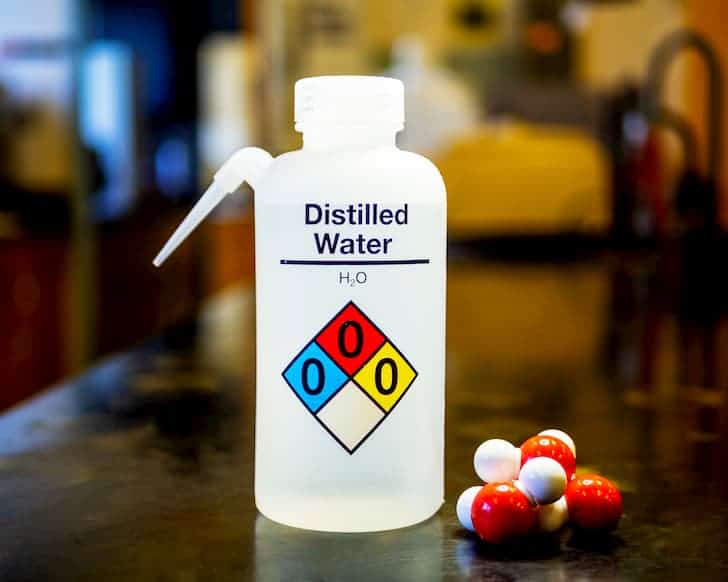Despite the earth’s surface being 71% covered by water, not all water is the same. Only about 1% of all that water is fit for human consumption, and even so, not all that water is the same. Some water is purified, some filtered, some is tap water, some spring water, and some is distilled water. They are all safe for human consumption, but they differ in one way or another.
Distilled water is a type of freshwater that has been boiled into vapor and then condensed back to liquid form in a separate container. It is a form of purified water as it is water that has been processed or filtered, removing impurities and making it suitable for use. This article will look at distilled water, how it is made, its uses, and the difference between distilled and purified water.
Distilled water is produced by boiling ordinary drinking water into water vapor. The vapor is then condensed back into a liquid, thereby removing impurities and minerals from the product. The process is called distillation, and it sees a liquid boiled into steam form and then the steam condensed back to liquid form.
Distilled water, therefore, tastes a bit different – flat and less flavourful as compared to regular drinking water. Distilled water has been praised to detoxify our bodies, thereby improving our overall health.
Others have also condemned it for leaching minerals from the human body, thus putting human health at risk. However, neither is true.
Distillation of water has been done since ancient times. It leaves out impurities when the water evaporates. The impurities include harmful microbes, as well as harmless and beneficial minerals from the water, including magnesium and calcium (Marengo, 2019).
Distilled water, having no minerals of its own, tends to pull them from whatever it touches, to maintain balance. It, therefore, means distilled water could pull small amounts of minerals from your teeth and other parts of the body when you consume it. It also means distilled water will pull minerals from the storage tanks or plastic bottles where it is stored.
Various Uses of Distilled Water
1. Drinking
The most obvious use of distilled water is drinking it. It is one of the purest forms of water, meaning it helps our bodies function at optimum. Distilled water may be better than tap water.
Assuming the tap water is in a place where the water is contaminated with harmful chemicals and pesticides, distilled water will be a better and safer alternative.
2. For cosmetic use
Most cosmetic products contain water. The water is a solvent so that the ingredients can transfer their benefits to the hair and skin. It also forms emulsions in lotions and creams for their easy application.
That water needs to be microbe, toxin, and pollutant-free, meaning distilled water is the best choice. Also, as it is pure, distilled water ensures there are no bacteria or contaminants in the product that could cause harm.
3. Laboratory experiments
Distilled water is free of contaminants or minerals that could taint results, explaining why most labs use it. Distilled water is pure, meaning it does not react with other chemicals, providing accurate experiments and results.
4. In lead-acid batteries and automotive cooling systems
Distilled water is suitable for use in lead-acid batteries as it is mineral-free. It is also suitable for use in automotive cooling systems and other devices where the build-up of minerals could damage such devices.
When a car is running, the cooling system has to work hard to cool it off. Mineral deposits in the water used could cause corrosion and build-up in the system, causing it to overheat.
5. Medical uses
As it is pure water, it has a variety of uses in the medical field. It is used when sterilizing medical instruments as it does not leave residue or deposits on them.
It is also used by surgeons to sterilize, preventing infections and cross-contaminations. Distilled water is equally used to clean wounds as it is pure, thereby preventing new infections. It is also used by dentists, especially after tooth extractions to rinse the mouth and wash away bacteria.
6. Used in making beer
Surprisingly, home beer brewers in the Czech Republic, have preferred distilled water for years to any other water. This is because it helps in the imitation of the extremely soft water found in Pilsen, where Pilsner-style beers come from.
7. Preferred for use in Continuous Positive Airway Pressure (CPAP) machine in the medical field
Distilled water is preferred in Continuous Positive Airway Pressure (CPAP) machines, the lifesaver machine for sleep apnea sufferers. Distilled water is used in such machines as it prevents bacteria from breeding.
As such, the machines do not have a build-up of mineral deposits that might hamper their correct functioning.
8. In the canned food industry
Distilled water is used in the canning process ensuring your fruit and vegetables remain in vibrant color. Hard tap water makes such goods look cloudy and distilled water is the best option. It also ensures the food’s flavor remains the same as the salts that could alter the flavor are not present.
9. Used in humidifiers
Humidifiers are used at home to help prevent dry skin, for plants and woods in the home, and are good for those who snore, and those with allergy and sinuses issues.
Humidifiers use distilled water as tap water has a higher concentration of minerals and other particles which could halt its functionality, and shorten its lifespan.
10. Used for the fish in home aquariums
Tap water contains minerals and chemicals that might be harmful to fish in an aquarium. As such, distilled water, which is free from chlorine and other minerals which do not affect one’s tank, is the best. Besides, it contains no bacteria, meaning the fish stay healthy.
Distilled Water vs Purified Water
1. Constitution
Distilled water contains no minerals, chemicals and contaminants. Purified water, on the other hand, does not contain contaminants or chemicals, but could still contain minerals.
2. Method of filtration
Distilled water is acquired through the process of distillation alone. Distillation is where the water is boiled and then the steam is condensed back into liquid form, removing the impurities and minerals. Purified water, could be arrived at in the same way, as well as through reverse osmosis or deionization.
The former refers to the filtration of water through a semipermeable membrane, removing salt and impurities, while the latter refers to the removal of salt and mineral ions from the water. Other forms of arriving at purified water include electrodeionization, electrodialysis, and carbon filtration.
3. Production
Producing distilled water requires the equipment required for distillation and is, therefore, a bit cheap. Purified water, on the other hand, requires more than just the equipment required for distillation. Due to the advanced techniques used, it is a bit more expensive.
4. One is only a form of the other
Distilled water is a form of purified water. It, therefore, applies that all distilled water is purified water, but not all purified water is distilled water.
Is Bottled Water Distilled?
The simplest answer to this question is No. Even if distilled water might find its way into a bottle and sold as distilled water, it is not. Here is why:
1. Its advertisement. Distilled water contains no minerals, impurities or contaminants. However, bottled water is advertised as ‘containing minerals’ that are essential for the human body. It, therefore, means that bottled water is not distilled.
2. The addition of chlorine. Bottled water companies tend to add some amount of chlorine in their bottled water, to kill microbes if they enter the bottle. It means that bottled water contains minerals or contaminants that should not be present in distilled water.
3. The presence of carcinogens. As already mentioned, distilled water contains no minerals and, therefore, tends to attract minerals present in their holding container.
It, therefore, means carcinogens and other BPAs could be present in bottled water, depending on the type of plastic and how long the water has been exposed in the bottle.
4. The pH levels. Distilled water is the purest form of water, meaning it has a neutral pH of 7. However, the pH of common bottled water is between 6.5 and 7.5, meaning it can be a bit acidic or alkaline, making it different from distilled water.
5. There is only one distilled water. There is only one type of distilled water, which has been arrived at through distillation. However, bottled water could be spring water, mineral water, or purified water.
References:
Bell-Young, L. (2018). Is Bottled Water Distilled?. ReAgent Chemicals. Retrieved from https://www.chemicals.co.uk/blog/is-bottled-water-distilled
Dhar, M. (2013). What Is Distilled Water?. Live Science. Retrieved from https://www.livescience.com/41510-what-is-distilled-water.html






